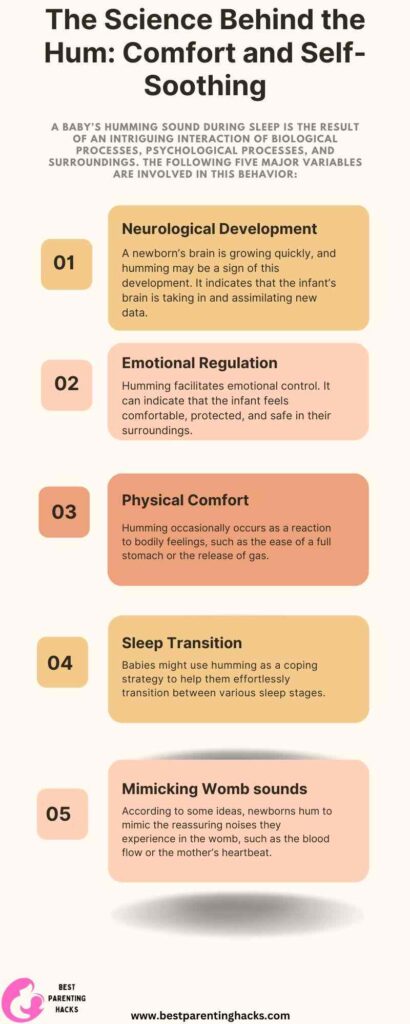Table of Contents
- The Science Behind the Hum: Comfort and Self-Soothing
- Understanding Baby’s Humming: A Natural Phenomenon
- Parental Observations and Responses: What I’ve Done
- When to Be Worried: Differentiating Between Normal and Unsettling Sounds
- Tips for Managing and Understanding Your Baby’s Sleep Humming
- Conclusion
- FAQs
A sleeping baby’s soft hum frequently acts as a tired parent’s lullaby. Even though it seems insignificant, there is a lot of significance and intrigue in that sound. I’ve spent numerous evenings trying to figure out what the quiet hums and murmurs coming from my baby’s cot mean. These noises, which combine instinct and comfort, provide us an insight into the intriguing realm of newborn behavior and growth.
To answer the question “Why does my baby produce humming sounds when sleeping?” in the title, it’s critical to realize that this pattern of behavior is not a coincidence. It’s an indication of your child’s developmental path and a calming technique to help them make sense of the unfamiliar and confusing world of feelings and experiences. We’ll examine the causes of this behavior as well as what it means for your child’s health and well-being as we go further into this subject.

The Science Behind the Hum: Comfort and Self-Soothing
A baby’s humming sound during sleep is the result of an intriguing interaction of biological processes, psychological processes, and surroundings. The following five major variables are involved in this behavior:
1. Neurological Development: A newborn’s brain is growing quickly, and humming may be a sign of this development. It indicates that the infant’s brain is taking in and assimilating new data.
2. Emotional Regulation: Humming facilitates emotional control. It can indicate that the infant feels comfortable, protected, and safe in their surroundings.
3. Physical Comfort: Humming occasionally occurs as a reaction to bodily feelings, such as the ease of a full stomach or the release of gas.
4. Sleep Transition: Babies might use humming as a coping strategy to help them effortlessly transition between various sleep stages.
5. Mimicking Womb sounds: According to some ideas, newborns hum to mimic the reassuring noises they experience in the womb, such as the blood flow or the mother’s heartbeat.
You Might Also Like to Read: Letting Baby Taste Food at 2 Months? What Should We Do?
Understanding Baby’s Humming: A Natural Phenomenon
In the first several years of life, babies are always adjusting to their environment. You might hear a buzzing sound as a result of this adaption process. It is a normal occurrence that benefits a baby’s growth in several ways. Not only is this activity typical, but it also indicates how a newborn is beginning to engage with their surroundings.
1. Sensory Response: Babies hum in reaction to their environment’s sensory overload. It aids in their processing and filtering of novel sights, sounds, and experiences.
2. Self-Soothing: Babies utilize humming as a self-soothing technique, just like adults do, particularly when their parents aren’t around.
3. Communication: Babies utilize humming as a means of communicating their wants and feelings in a way that they can control, even when they are still developing their spoken abilities.
4. Memory Development: Humming has been connected to memory development. Recognizable melodies or beats can support memory and cognitive growth.

Parental Observations and Responses: What I’ve Done
Seeing your infant hum might make you wonder and worry at the same time as a parent. I was first fascinated by this new habit and found myself checking on my child all the time. I eventually gained the ability to recognize these noises and react correctly.
1. Observation: Take note of the buzzing patterns. Does it happen during particular sleep phases or at particular times?
2. Recording: You may monitor shifts and trends in your child’s humming activity by keeping a journal.
3. Relaxation: Acknowledge that your baby’s noises are a natural part of their growth and learn to find solace in them.
4. Consultation: Don’t be afraid to speak with your physician if you see any modifications or have any concerns.
5. Sharing: Talk to your caregiver or spouse about these insights. By exchanging thoughts, you can have a deeper grasp of your baby’s requirements.
You Might Also Like to Read: Should I Wake My Sick Baby to Eat?

When to Be Worried: Differentiating Between Normal and Unsettling Sounds
Humming is usually a harmless habit, but occasionally it might be a sign of something more severe.
1. Consistency: The humming is probably okay if it is constant and doesn’t appear to be upsetting.
2. Associated Symptoms: Keep an eye out for symptoms such as breathing difficulties, continuous sobbing, or indications of pain.
3. Changes in Pattern: Abrupt variations in the humming’s rhythm or intensity may indicate that you should pay more attention.
4. Professional Advice: For ruling out any deeper causes, always consult a pediatrician when in doubt.

Tips for Managing and Understanding Your Baby’s Sleep Humming
It takes a combination of observation, understanding, and intuition to understand and control your baby’s humming.
• Create a Comfortable Environment: Make sure your infant has a cozy sleeping space with the right amount of heat and little disturbances.
• routine: To aid in your baby’s settling and sense of security, create a regular bedtime ritual.
• Soothing Techniques: Try a variety of calm methods, such as quiet music or gently rocking, to see if they can stop the humming.
• Stay Informed: To better comprehend and react to your baby’s behaviors, stay up to date on infant development.

Conclusion
When a baby hums as they sleep, it conveys a lot about their stage of development. It’s a harmless, reassuring habit that marks a baby’s developing awareness of their surroundings. Comprehending and valuing this conduct as parents may strengthen our bond with our children and serve as a reminder of the fascinating and exquisite intricacies of early life development.
FAQs
1. Is humming in slumbering newborns normal? Yes, this is a typical and healthy activity for infants.
2. What does a sleeping baby’s humming indicate? It frequently denotes ease, self-satisfaction, and a reaction to sensory input.
3. If my kid hums a lot or loudly, should I worry? In general, no. See a pediatrician, though, if there are any symptoms of discomfort along with it.
4. Can my baby’s quality of sleep be impacted by humming? It is often a natural element of sleep activity and has no detrimental effects on the quality of sleep.
5. How can I distinguish between a harmless humming and an indication of discomfort? Keep an eye out for any other indications of unease or anxiety, such as agitation or adjustments to eating patterns.




